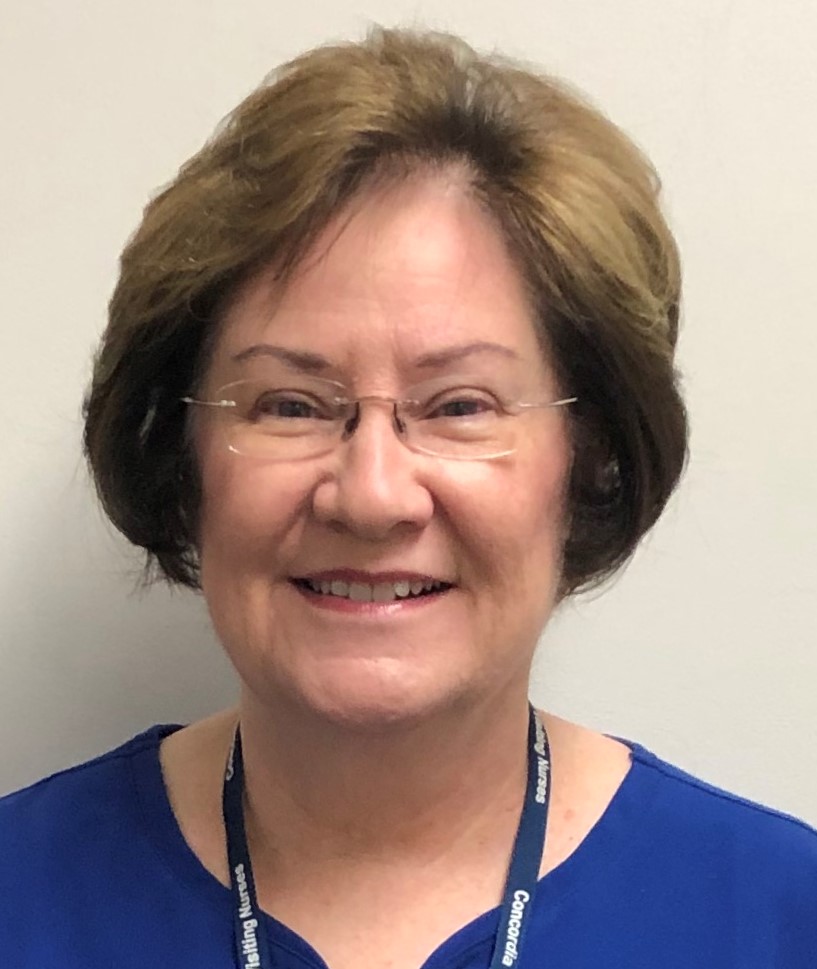March is National Nutrition Month: A Q & A with a Registered Dietitian

In honor of National Nutrition Month, we spoke with Concordia Visiting Nurses’ Registered Dietitian Helenkay Smith, MS, RDN, LDN about how she helps her home health patients manage their nutritional needs while they are being treated for a variety of medical conditions. In her role at Concordia, Helenkay provides thorough and explanatory advice for those navigating chronic and short-term diagnoses.
In the wake of the COVID-19, it is more critical than ever to maintain good nutrition and adequate hydration. Helenkay speaks about diets for those diagnosed with diabetes and congestive heart failure, two conditions that could potentially put a patient at risk for complications from viral infections. Her adapted meal plans for individuals with these diagnoses are timely as they are designed to boost one’s immunity – one of our greatest defenses against COVID-19.
Helenkay joined the Concordia family in May of 2016 as a home health Registered Dietitian. She has worked in the nutrition field for over 35 years in a variety of clinical settings and is a faculty member for Community College of Allegheny’s Dietetic Program.
Q. Can you provide an overview of your role as a home health Dietitian?
A. First and foremost, my function is to be a resource for patients, family and staff. Understanding basic nutrition concepts of the most common situations, such as diabetes management and heart failure, while adapting to the unique and complex care of our patients requires assessing medical issues and medications and sometimes adjusting the prescribed diet to what will work in the home setting. Finally, I help educate the patient, family and caregiver on those concepts. My mantra has always been “meet the patient where they are.”
Q. What are some common medical diagnoses that affect a patient’s nutritional status?
A. Diabetes and congestive heart failure are the first that come to mind. Diabetes nutrition management requires daily attention to consistent carb intake while moderating sodium, avoiding concentrated sweets, a nod to heart healthy choices, lean in on plant-based foods, choose lean protein sources and encouragement of fiber-rich food sources. Actually, if all of us ate similar to a diabetes-friendly diet, we would be consuming a very healthy eating style! Another diagnosis directly connected with nutrition status is the wound healing of pressure ulcers. This diagnosis needs good nutrition, adequate hydration and plenty of calories to spare protein that enables amino acids to do their collagen-building job.
Q. What would a recommended nutrition plan look like for a congestive heart failure patient?
A. Congestive heart failure requires strict adherence to low sodium nutrition therapy and sometimes a fluid restriction. In addition, the patient is encouraged to consume plenty of fruits, vegetables, leafy greens, whole grains and calcium-rich foods. These foods contain potassium, magnesium and calcium, which act as a counterbalance to sodium in fluid balance and blood pressure management. Limiting sodium consumption requires avoiding table salt and processed foods, eating more whole foods and cooking from scratch when possible.
Q. What questions do you find imperative to ask your patients about their nutrition when doing their initial consultation?
A. Capturing a preliminary diet history is very telling. I ask what the patient eats most days and for them to describe a typical breakfast, lunch, dinner and snacks. From there, I always inquire about hydration, which often reveals too little fluid consumption for most older patients. For patients with diabetes, this may reveal sugar-sweetened beverages that are at the very heart of their poor blood sugar management. Other essential questions include the patient’s height, weight, recent weight changes along with who is the primary grocery shopper and food preparer in the household. All of these questions allow me to give the patient immediate feedback and an opportunity to set several relevant nutrition goals.
Q. Why is it important for older adults to increase their daily fluid intake?
A. Older adults typically need to consume more fluids than they believe they should. As we age, we lose our sensitivity to thirst, some may take a diuretic (causing frequent urination) and are less active. For these reasons, older individuals begin to consume less fluids, as they aren’t thirsty and may worry about some challenges like their mobility and how they will get to the restroom. Their fluid needs, however, remain nearly the same as when they were younger, assuming their height and weight have remained stable. So, yes, they do need to increase their fluid intake in order to meet their daily needs. In addition, they could be prone to bladder infections if they aren’t consuming enough fluids. Also, they may be taking many medications that likewise require adequate fluids to flush their kidneys.
Q. What advice do you give patients who find it difficult or overwhelming when faced with an entirely new nutrition plan?
A. As I hinted earlier, it’s important to meet patients where they are and explain that no one expects them to be perfect. After capturing a diet history, it becomes clear where I can nudge a correction. From there, I suggest making one or two small changes at a time until mastered and then move forward to the next change. I also provide all of my patients with my professional contact information should they be pressed with future questions or concerns.
If you or a loved one receive doctor orders for home health care services, ask for Concordia Visiting Nurses and experience high quality care and nutritional education provided by experienced Registered Dietitians like Helenkay! For more information, call us at 1-877-352-6200 (Concordia Visiting Nurses) or contact us any time via our online contact form.
Get Updates From Concordia
There is always a LOT happening at Concordia! Would you like to stay up-to-date with our news and events? Sign up for our monthly e-newsletter here.
